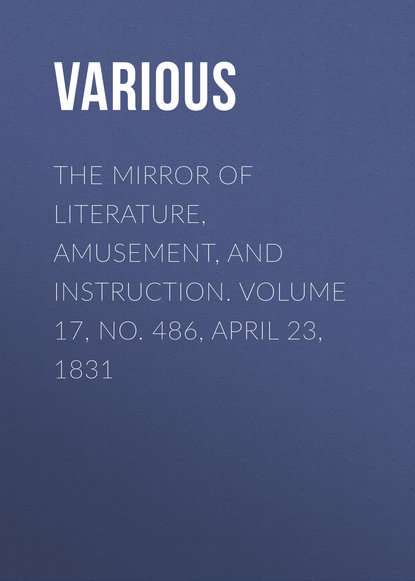По всем вопросам обращайтесь на: info@litportal.ru
(©) 2003-2024.
✖
The Mirror of Literature, Amusement, and Instruction. Volume 17, No. 486, April 23, 1831
Автор
Год написания книги
2018
Настройки чтения
Размер шрифта
Высота строк
Поля
“The son of Sir Tristram by this lady was Sir Marcus Beresford, who married the heiress of the estates and title of Le Pen; was created Baron Beresford and Earl of Tyrone; and was father of George Beresford, first Marquess of Waterford, the late Right Hon. John Beresford, William Beresford, late Archbishop of Tuam, Lady Frances Flood, Lady Araminta Monk, Lady Catherine Jones, Lady Glenawley, and Lady Betty Cobbe.”
(To be concluded in our next.)
OLD POETS
WILL
Will puts in practice what the will deviseth,
Will ever acts, and Wit contemplates still,
And as from Wit the power of Wisdom riseth,
All other virtues daughters are of Will.
LODGE.
LOVE
Where heat of Love doth once possess the heart,
There cares oppress the mind with wondrous ill,
Wit runs awry, not fearing subtil smart,
And fond desire doth ever master will.
The belly neither cares for meat nor drink,
Nor o’erwatched eyes desire to wink.
Footsteps are false and wavering to and fro,
The brightsome flower of beauty fades away,
Reason retires, and Pleasure brings in Woe,
And Wisdom yieldeth place to black decay.
Counsel, and fame, and friendship are condemned,
And bashful shame, and gods themselves contemned.
Watchful suspect is kindled with despair,
Inconstant hope is often drown’d in fears;
What folly hurts not, fortune can repair,
And misery doth swim in seas of tears.
Long use of life is but a living foe,
As gentle death is only end of woe.
WATSON.
PRINCES
A prince’s safety lies in loving people,
His fort is Justice (free from stratagem),
Without the which strong citadels are feeble,
The subjects’ love is won by loving them:
Of loving them no oppression is the trial,
And no oppression makes them ever loyal.
SYLVESTER.
GRIEF
True grief is fond and testy as a child,
Who wayward once, his mood with naught agrees.
Old woes, not infant sorrows, bear them mild,
Continuance tames the one, the other wild.
Like an unpractis’d swimmer, plunging still
With too much labour drowns for want of skill.
SHAKSPEARE.
FAME
A lofty subject of itself doth bring
Grave words and weighty, of itself divine;
And makes the author’s holy honour shine.
If ye would after ashes live, beware
To do like Erostrate, who burnt the fair
Ephesian Temple, or to win a name
To make of brass a cruel calf untame.
KING OF SCOTS.
SPRING
The Winter with his grisly storms no longer dare abide,
The pleasant grass with lusty green the earth hath newly dyed,
The trees hath leaves, the boughs do spread, new changed is the year,
The water brooks are clean sunk down, the pleasant boughs appear,
The Spring is come, the goodly nymphs now dance in every place:
Thus hath the year most pleasantly so lately chang’d her face.
EARL OF SURREY.
THE SOUL
—To show her powerful deity,
Her sweet Endymion more to beautify,
Into his soul the goddess doth infuse
The fiery nature of a heavenly muse;
Which the spirit labouring by the mind,
Partaketh of celestial things by kind:
For why the soul being divine alone,
Exempt from gross and vile corruption,
Of heavenly secrets incomprehensible,
Of which the dull flesh is not sensible,
And by one only powerful faculty,
Yet governeth a multiplicity,











